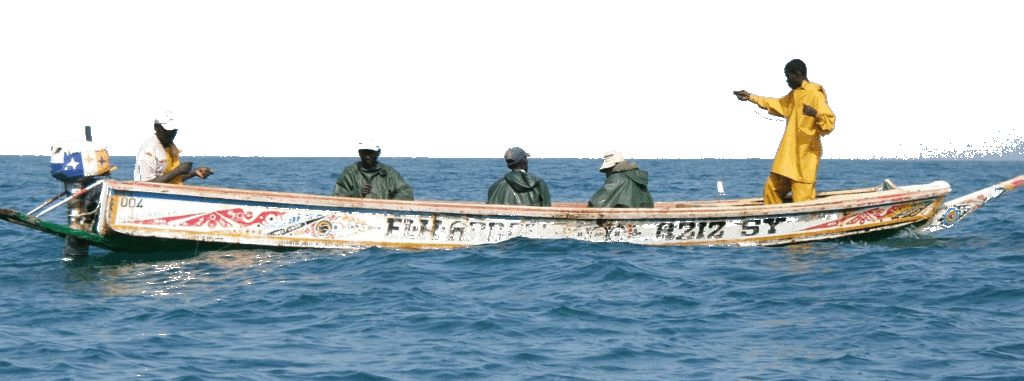
Handliners on a pirogue at the coast off Kayar, Senegal: one of the low impact fishing methods which is also easiest to stun and kill each fish as soon as hauled aboard. (Photo by the author)
Is there animal welfare in fisheries at all?
You may feel confused by this question for a moment before reading on. Stay in this confusion for a while. Your first feeling is absolutely correct: catching a fish is the opposite of animal welfare for a fish that ends up on the hook or in the net to be suffocated on board or processed alive, which is the usual fate of billions and billions of fishes every year.
By Billo Heinzpeter Studer
A similar contradiction is present in the term ‘humane slaughter’, a euphemism for the per se inhumane treatment of animals — they are simply killed. What animal welfare advocates want to address with this term is the effort to minimise the pain and suffering of animals at the time of slaughter.
Claims about animal welfare in fisheries must be viewed with a critical eye. If it is more than just propaganda, it usually refers to the introduction of ‘humane slaughter‘ procedures, which would already be a step forwards, but does not reduce animal suffering as such.
Little attention has been paid to suffering throughout the fishing process, from the capture of the first animal to the death of the last. To investigate this, I conducted a project together with artisanal fishermen in Senegal for fair-fish, from 2004 to 2009 [1]. And in 2021, I designed a research project, my last for fair-fish, to define the opportunities for reducing animal suffering in fisheries as a function of fishing methods and target species, including bycatch, discards and other harm to animals caused by fishing [2]. The study, conducted by a consortium of five institutions, examines each step from the use of fishing gear to the end of all affected animals. The results, including guidelines for the international seafood certification scheme ‚Friend of the Sea‘, are expected in 2025.
Since 2023, there has been even more movement from science and practice to reduce the suffering of animals in fisheries: The ‘Catch Welfare Platform‘ [3] brings together stakeholders from the fisheries sector to look for possible improvements in various fishing gear and methods, both in pelagic and demersal industrial fisheries and in artisanal fisheries.
While there will never be animal welfare in fisheries, there is a lot we can do to preserve the welfare of all aquatic animals. Read more here.
Is there anything you can do now?
You could take a closer look at the fish you want to buy or order — species, stock condition, fishing method — to choose the ‘least bad‘. The FishTest [4], which I once developed and which is being continued by fair-fish, is a simple but detailed tool to do this. It also assesses the impact of the fishing method on the suffering of the fish (and fellow inmates) in a very rough approximation, now a good estimate, in the near future based on the results of the Carefish/catch project [2].
My rules of thumb:
- Fish once a month max [4]
- rather from wild catch
- rather from artisanal fisheries with less destructive methods
- preferably caught by smaller active gears that allow* for a short capture time and immediate stunning and killing, such as handline, rod and line, pole and line, short longlines, trolling (not to be confused with trawling), encircling nets, beach seines, and monitored traps. (* Only certification will show whether this is really the case, until then one can always support fisheries that use the methods mentioned above).
Sources:
[1] Senegal project
[2] Carefish/catch project
[4] FishTest
[5] fish-fact 33, ‘Edible fish‘ (page 18 f.)